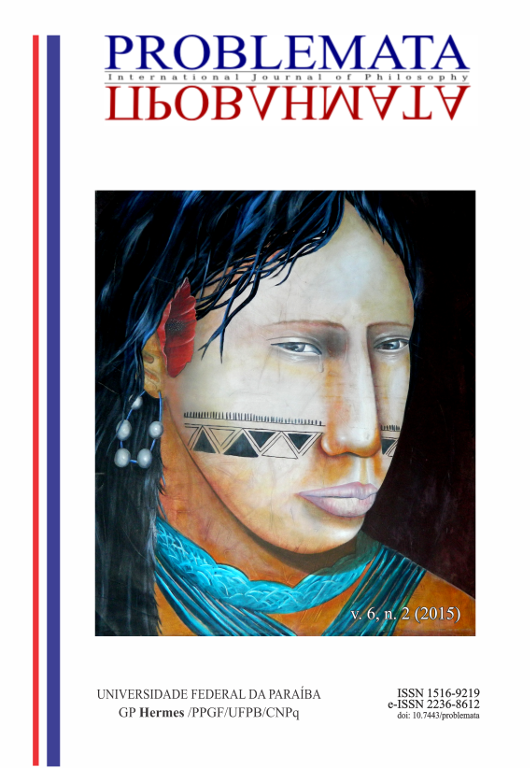PORQUE REPRESENTAÇÕES SÃO UM PROBLEMA PARA REPRESENTACIONISTAS
DOI:
https://doi.org/10.7443/22717Keywords:
argumento da transparência da consciência, condição representacional, qualia, representação, representacionismo.Abstract
Na filosofia da mente, filósofos de diferentes posições concordam que experiências são representações. Dentre esses filósofos, os representacionistas merecem especial destaque, pois defendem que esse caráter representacional da experiência é o que define a consciência. Para tanto, eles geralmente se fiam no argumento da transparência da consciência (cf. HARMAN 1990, DRETSKE 1995 e TYE 1995). Esse argumento, que foi introduzido por MOORE 1903, sustenta que não percebemos as propriedades das nossas experiências, antes percebemos as propriedades de objetos e eventos extramentais através das nossas experiências. O problema com essa visão é que ela parece incompatível com o que sabemos sobre como representações operam. Neste artigo, meu objetivo é expor esse problema.
[doi:http://dx.doi.org/10.7443/problemata.v6i2.22717]
Downloads
References
CHALMERS, D. The Conscious Mind. Oxford: Oxford University Press, 1996.
______. The Representational Character of Experience. In LEITER, B. (ed.). The Future for Philosophy. Oxford University Press, 2004.
CUMMINS, R. Meaning and Mental Representation. 3. ed. Cambridge, MA: MIT Press, 1995.
DRETSKE, F. Conscious Experience. Mind (New Series), v. 102, n. 406, p. 263-283, abr. 1993.
______. Naturalizing the Mind. Cambridge, MA: MIT Press, 1995.
______. How Do You Know You Are not a Zombie. In GERTLER, B. (Ed). Privileged Access: Philosophical Accounts of Self-Knowledge. Ashgate Publishing Limited, 2003.
FLORIDI, L. Information. In MITCHAM, C. Encyclopedia of Science, Technology and Ethics. Thomson Gale, 2005, p. 998-1004.
GARDNER, H. A nova ciência da mente. São Paulo: Editora EDUSP, 2003.
HARMAN, G. The Intrinsic Quality of Experience In TOMBERLIN, J. (ed.). Philosophical Perspectives, v. 4, Action Theory and Philosophy of Mind, 1990.
JACKSON, F. Epiphenomenal Qualia. The Philosophical Quarterly, v. 32, n. 127, p. 127-136, 1982.
LYCAN, W. Consciousness and Experience. Cambridge, Mass.: The MIT Press, 1996.
______. Representational Theories of Consciousness. In ZALTA, E. (ed.). Stanford Encyclopedia of Philosophy (SEP), 2000 (revisão em 2006). Disponível em: <http://plato.stanford.edu/entries/consciousness-representational/>
MARR, D. Vision: A computational investigation into the human representation and processing of visual information. Cambridge, Mass.: The MIT Press, 2010.
MOORE, G. The Refutation of Idealism. Mind, New Series, v. 12, n. 48, p. 433-453, 1903.
NAGEL, T. What Is It Like to Be a Bat? Philosophical Review, v. LXXXIII, n. 4, p. 435-450, 1974.
PEACOCK, C. Sense and Content: Experience, Thought, and Their Relations. New York: Oxford University Press, 1983.
PITT, D. Mental Representations In ZALTA, E. (ed.). Stanford Encyclopedia of Philosophy (SEP), 2012. Disponível em: <http://plato.stanford.edu/entries/mental-representation /#Representationalism>
ROSENTHAL, D. Two Concepts of Consciousness. Philosophical Studies: An International Journal for Philosophy in the Analytic Tradition, v. 49, n. 3, p. 329-359, 1986.
TYE, M. Ten Problems of Consciousness. Cambridge, Mass: The MIT Press, Bradford Books, 1995.
Downloads
Additional Files
Published
Issue
Section
License
Authors who publish with this journal agree to the following terms:
- Authors retain copyright and grant the journal right of first publication with the work simultaneously licensed under a Creative Commons Attribution License that allows others to share the work with an acknowledgement of the work's authorship and initial publication in this journal.
- Authors are able to enter into separate, additional contractual arrangements for the non-exclusive distribution of the journal's published version of the work (e.g., post it to an institutional repository or publish it in a book), with an acknowledgement of its initial publication in this journal.
-
- Authors are permitted and encouraged to post their work online (e.g., in institutional repositories or on their website) prior to and during the submission process, as it can lead to productive exchanges, as well as earlier and greater citation of published work (See The Effect of Open Access).





